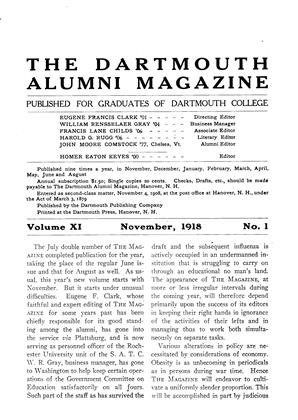Dartmouth and Hanover, healthful as is their location, were unable to escape the ravages of the epidemic of Spanish influenza, or influenza-pneumonia .as it is more properly called, which has swept so disastrously over the country this fall. Several hundred cases of the disease occurred in the community, among the students, the enlisted men of the Training Detachment, and the residents of the town. Five students, ten soldiers in the Detachment, one member of the faculty, and several townspeople died. But the epidemic was brought to a stop here much more quickly than in most communities and the percentage of fatalities was lower, so that we may congratulate ourselves on our good fortune in escaping so easily as we did.
That which contributed most to the quick control of the situation was the stopping of all class work of the College for a period of two weeks. All academic work ceased on the morning of October 1, the day of the induction of the S. A. T. C., to be resumed on the morning of October 14, when further spread of the disease appeared to be checked. During that period the outdoor work of the S. A. T. C. went on in intensified form. The only activity was the drilling of units, and the students were thereby kept out of doors for at least nine hours a day—in itself a good preventive of the influenza.
The most serious conditions occurred in the Training Detachment, where large numbers of the men were ill at the same time. The Medical Officer, Lt. J. P. Hall, had the assistance in his work of Dr. Kingsford and Dr. Bowler, and that part of the Gymnasium ordinarily used by the home and visiting teams was turned into a hospital under the direction of the local chapter of the Red Cross. Too high praise cannot be given to the members of that chapter, who gave their services night and day in nursing, cooking, and otherwise caring for the sick for a period of nearly four weeks. When conditions improved, the men were removed for convalescence to College Hall.
The undergraduates whose illness terminated fatally were: George Elmer Conant of Contoocook, N. H., Theodore Wadleigh of Milford, N. H, Harold Mooney of Alton, N. H., all of the freshman class; Richard Craw-ford Campbell Jr., of Denver, Colorado, of the sophomore class, son of R. C. Campbell '86; and Spencer Wallace Slawson of Green-wich, Connecticut, also of the sophomore class. The member of the faculty who died was Dr. E. C. Evans of the department of political science, a more extended notice of whom appears elsewhere in this number of the MAGAZINE.
 View Full Issue
View Full Issue
More From This Issue
-
 Article
ArticleTHE COLLEGE IN KHAKI—WHAT THE S. A. T. C. IS AND HOW IT WORKS
November 1918 By Ernest Martin Hopkins -
 Article
ArticleThe July double number of THE MAGAZINE completed publication for the year,
November 1918 -
 Article
ArticleMEETING OF THE BOARD OF TRUSTEES
November 1918 -
 Article
ArticlePROFESSOR FRANK ARTHUR UPDYKE
November 1918 -
 Article
ArticleTHE DARTMOUTH COLLEGE TRAINING DETACHMENT, N. A.
November 1918 By Charles A. Holden '95 -
 Class Notes
Class NotesCLASS OF 1894
November 1918 By Charles C. Merrill
Article
-
 Article
ArticleMANCHESTER, N. H., ALUMNI ESTABLISH NEW SCHOLARSHIP
June, 1923 -
 Article
ArticleSecretaries to Meet
April 1933 -
 Article
Article'62 Men Evaluate Their College Preparation
November 1959 -
 Article
ArticleMovie Classics Shown Daily As Experiment in Education
November 1960 By DAVID STEWART HULL '60 -
 Article
ArticleTuck School
November 1944 By G. W. Woodworth, H. L. Duncombe Jr. -
 Article
ArticleUNDERSTANDING
November, 1025 By President Ernest Martin Hopkins


